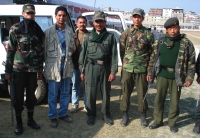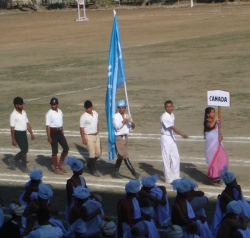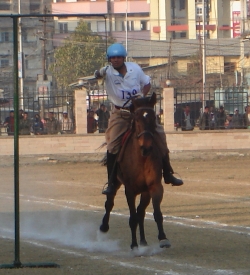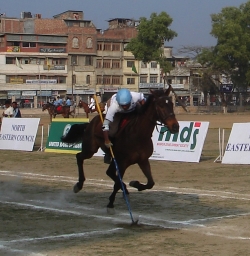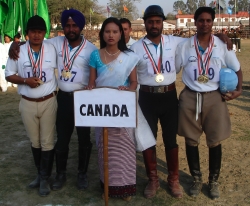 |
 |
![]()
|
Archives |
|
|
The 2008 International Tent Pegging Championships Tent pegging, the cavalry sport of equestrian skill-at-arms, was born in the Indian Empire in the 4th Century BC. It was, therefore, daunting for me to represent Canada when the International Tent Pegging Championships returned to India in 2008. However, even in a sport that has endured nearly a million days, a novice and a young country can sometimes have their day. Further resources are at:
|
|
|
Once more unto the breach
Letting slip what little grasp I retain on sense and reason, I decided to fly to Asia to represent Canada and UNICEF at the 2008 International Tent Pegging Championships, just a few days before the games began. It was undoubtedly an appropriate approach to a sport that prizes reckless abandon above forethought. A 2 500 year-old discipline of horse, lance, sword, and sabre, tent pegging is better known in the New World as equestrian skill-at-arms. My tent pegging page gives the details of the sport, the championships, my partnership with UNICEF, and how I came to captain Canada's national team. I first took up the sword and stirrup for Canada at the 2007 international championships in the Sultanate of Oman, and if I did not ride entirely to glory, I hope I represented our country with honour. During the championships, I kept a daily blog of my misadventures astride Shomool, a warhorse out of the Sultan's stables, bred for bloodlust and battle frenzy. This year, the international championships were held in Imphal, a city in India's north-east hinterland. With the odd feral boar rooting about the streets, I was not surprised to find my Internet access from Imphal halting at best. I am, therefore, only able to publish my account of the games to my blog after my return to Toronto. I trust the account will not suffer for the delay. I will also publish images from the games to my online photo albums at Facebook and at Flickr, as well as through an iPhoto photocast. My journey to the far side of the world and to the edge of medal podium is one that I will carry with me always, as one of the most improbable experiences in a life littered with happy absurdities. |
|
|
Dazed, Disoriented, and Dyspeptic
Travel, it is commonly said, expands the mind. Well, by the end of my trek to Asia to captain UNICEF Team Canada at the 2008 International Tent Pegging Championships, my head was fit to explode. The championships were to be held in Imphal, the capital of the Indian state of Manipur, in the remote north-east corner of the subcontinent and in the shadow of the Himalayas. I had travelled for three days from my home in Toronto via half a dozen flights before finally arriving, dazed, disoriented, and dyspeptic from too many curry-based breakfasts. A gaggle of men in fatigues sporting machine guns came forward to receive me at Imphal's airport. Well, I thought, at least I brought my sword. Manipur borders on the brutal dictatorship of Myanmar, and the state itself has been in the grips of an armed insurgency since 1958. As a result, international visitors need special clearance from India's intelligence service to enter the region, and a halo of armed guards surrounded me throughout my stay. The troops of my security detail were friendly and beaming, but their forefingers were never off their triggers. The drive to the competition grounds was still more menacing: Imphal's traffic seems governed not so much by laws as by anaemic suggestions that serve only to provoke the population to defiance. Vehicles regularly drive on the wrong side of the road, directly into oncoming traffic; swarms of ramshackle scooters, belching clouds of acrid smoke and carrying entire families balanced on the handlebars, dart around the cars and trucks; pedestrians and livestock meander heedlessly amidst it all. Yet, by some unfathomable miracle, it does not end in a daily catastrophe of twisted metal and broken bones. I arrived at the grounds in time to take in the final stages of India's National Military Equestrian Championships, which had been scheduled to precede the International Tent Pegging Championships. The stadium was filled to overflowing, with those who had been unable to obtain seats perched on the walls or pressed up against the gates. I was keenly aware of what I was witnessing. The finest cavaliers from across this country of more than a billion people and of more than three millennia of cavalry history were engaged in the final stage of an epic clash. It had begun a year earlier in villages and cities scattered across three million square kilometres, and it would end here, with the selection of two professional national teams, who would contend against the rest of us for the world championship of a sport their country has regularly dominated since the days of Alexander the Great. It was unutterably intimidating. I retired to my hotel and collapsed into bed, falling asleep almost before my body struck the mattress. Outside, a cordon of troops kept a protective watch over the building. I must confess that I was less worried about the possibility of meeting insurgents on the streets, than I was about the certainty of meeting my fellow tent peggers on the field of honour. |
|
|
Honour and Damp-Eyed Idealism
Jet lag had me out of bed and pacing my hotel room at 3am on the opening day of the International Tent Pegging Championships. I pondered the plumbing arrangements in my bathroom: the sink and commode were integrated into the shower, presumably so that a guest's ablutions would also serve as a means of washing the facilities. It was a terribly clever, if rather septic, way to conserve water. I eventually tumbled downstairs to the lobby, where the house rules were writ large, warning guests against the evils of strong drink, gambling, and the temptations of the opposite sex. The officer in charge of my security detail was waiting for me, an unidentified beverage in one hand and a deck of playing cards in his breast pocket, but with no social company that I could see. We drove to the stadium, never pausing for man, beast, or oncoming vehicles. I noticed that, in a burst of characteristically Indian prestige inflation, there were seats in the stands reserved for VIPs, for VVIPs, and for VVVIPs. They all looked equally uncomfortable. The venue was the Imphal Polo Ground. Located in the city centre, it is the oldest operating polo field in the world: it was hosting polo matches in 33 AD, and it continues to host regular fixtures to this day. Far from the elitist fantasies of Ralph Lauren commercials, polo in Manipur is a sport of the masses: after working their fields, many farmers unhitch their horses from the plough and ride social chukkas with their neighbours. Polo in Manipur is also alarmingly aggressive. Riders may intentionally collide with one another, may pull one another out of the saddle, and may even pummel one another with their mallets. Tent pegging is almost safe by comparison. The opening ceremonies featured a (rather more sedate) demonstration of polo, much speechifying by a procession of political grandees, a good deal of uniformed marching about, the release of helium balloons carrying celebratory banners aloft, and a performance by a vast array of dancers. Alas for the dancers, they practised their craft in bare feet, after the horses had left their calling cards on the field. The most important part of the day, however, was the draw for horses and the announcement of the national teams. In the lottery that randomly paired riders with unfamiliar mounts, I drew a thoroughbred named Gagan. It was, I thought to myself, a good omen: "Gagan" is the Jain-language translation of "Akaash". Then he bit me. Chance, my own horse at home in Canada, would certainly have approved. The selection of teammates was not as painful, nor did it leave a scar. I had competed in the 2007 International Tent Pegging Championships as an individual, but for the 2008 championships, I needed to enter a full team of four. As I was the only New World competitor invited to the 2008 championships, UNICEF Team Canada would be a composite multinational team of riders selected by me. Fortunately, because of all the equestrian competitions held in Imphal prior to the international championships, the city was awash with riders who had not made the cut for their respective teams. As all of my childhood friends will certainly attest, I was never one of nature's athletes, and no one was more surprised than I was when I took up riding as an adult and began representing Canada. Not surprisingly, I will always my first affinity with those who hope for a second chance. There were legions of horseless riders remaining in Imphal, but the choice of teammates proved surprisingly easy. Bimol Singh, Jeetender Singh, and Talwinder Singh (no, none of them were related) stood out for me not simply because they were well-recommended as tent peggers, but still more because they treated the horses with compassion and treated the grooms with respect. Far too often in equestrian sports, competitors see horses not as living, thinking, feeling creatures, but as automatons who can be compelled by force or terror to do a rider's bidding. Just as often, competitors show extravagant indifference to the grooms who provide the vital but unglamorous work of caring for the horses, mending equipment, and mucking out the stables, and who into the bargain are frequently the unsung best horsemen on the field. I may be something of a damp-eyed idealist, but I sincerely believe that in the long term, the person whose impulse is to do good is the person most likely to do well. More importantly, I am conscious that when we take to the field under the banner of UNICEF Team Canada, my teammates and I ride first and foremost for the honour of my country and the cause of the world's children, not for medals, ribbons, or other baubles. I saw Bimol abandon a run out of concern for his horse, rather than carry on in an attempt to win glory for himself at the animal's expense. I saw Jeetinder retire after his runs to the grooms' tent to socialise with them, rather than put his feet up with the athletes whose own grooms were polishing their boots. I saw Talwinder advising riders from visiting teams, even though he knew that they would use that advice to try to best him. And I knew I was looking at the three riders whom I should be proud to call my teammates. The four of us had never met before, we had three different mother tongues between us, and we would have only two days to prepare before we would compete as a team. "Ride hard and ride fast, or ride home," goes the cavalier's proverb. And I was a very long way from home. |
|
|
A Struggle Against Fear and Time
The first day UNICEF Team Canada met as a team at the 2008 International Tent Pegging Championships was not entirely auspicious. Bimol, my sole English-speaking teammate, served as my translator. However, I needed no help interpreting Jeetender and Talwinder's body language as they weighed our prospects once the other teams rode forward. Tent pegging may be one of the most ancient living equestrian sports, and its following may have spread via empires across the world, but there is no doubting who are its modern superpowers. Oman's national team is under the personal patronage of the country's Sultan, and takes its members from the Royal Cavalry. Its full-time riders travel the world tent pegging, competing in polo, and training under riding masters whose names are legend. The horse holds an almost mystic place in Omani history, and the oil-rich nation is eager to add new equestrian triumphs to those of old. Glory, however, would mean felling the sport's colossus. Tent pegging was born in the Indian Empire 2 500 years ago, and has been largely dominated by India ever since. Its national team draws on the breadth of a subcontinent of more than a billion people, on the depth of a cavalry whose ancestry recalls such storied regiments as the Bengal Lancers, and on the vigour of modern horse-mounted units that still patrol the western deserts and the eastern mountains. For added measure, as host, India was permitted to field not one, but two national teams. The 2008 international championships were to be essentially a Homeric struggle for global ascendancy between these two national titans. In this context, even I, a pathological optimist, realised that Jeetender and Talwinder's misgivings about UNICEF Team Canada's hopes might not be entirely misplaced. We began training as best we could in the brief time we had together. My new teammates had been competing in the National Championships in the weeks preceding the International Championships; over the following two days, I would have to build towards a common peak through the individual runs during the first part of the day, while we would develop as a team through group practice runs together during the second part. On the first day, my individual runs were unexceptional. Our group practices, however, were a different matter. Team tent pegging requires riders to mount unfamiliar warhorses bred for bloodlust, and gallop them in formation, while wielding sword or lance to simultaneously smite targets. It demands a ballet of co-operation at a flying tempo. As we gathered at the start of the course, Bimol and Talwinder's horses, Renu and Raja II, lunged for one another's throats. Jeetender's horse Rajkumar spun about on his forehand, dealing out deathblows with his hind legs if any other creature came into his orbit. My horse Gagan gave vent to his rage by gnawing on my riding boot as I struggled to keep him from the fray. After a few runs, we dismounted and considered one another gravely. My teammates were prepared to entertain unorthodox measures, and I suggested one: we abandoned our practice, and instead unsaddled our horses and allowed them to graze together untroubled. I have encountered many horses and people who appeared naturally vicious, but were revealed by simple acts of kindness to have been merely grappling with fear. If my teammates and I were apprehensive of the international, our horses were doubtlessly more so: they had been ridden hard during the earlier nationals and could clearly sense that further exertion lay ahead. Released, the horses ate contentedly, and gradually mingled together as they gravitated towards the choicer tufts of grass. With daylight fading, we led our horses back to their stalls and into the care of the grooms. Our team had had almost no practice together, but I hoped that we had gained something better than anything that could come through rote. The first day's pattern would repeat itself the second day, though our horses became marginally more co-operative. I was convinced that if we could continue for another fortnight, perhaps for just another week, we would win their full confidence, and become a team of men and beasts truly able to strive together as one. But we did not have another fortnight, or another week, or even another day. We had until the morning. When we next mounted up, it would be to face our rivals on the field of honour. |
|
|
One Gold Medal, One Bronze Medal, and One Improbable Day
The days of reckoning for UNICEF Team Canada at the 2008 International Tent Pegging Championships arrived with a dull thud, as I rolled out of bed, still bleary-eyed from the eleven-hour time difference between my home in Toronto and the locale of the games in Imphal. I met my teammates at the stadium shortly after dawn. Slowly, the sun filled the skies, the crowds filled the stadium, and we mounted our horses and rode out unto the field of honour. Though it is the most storied of the ten equestrian disciplines recognised by the FEI, the global governing body for Olympic and international horse sports, tent pegging is undeniably an eccentric pursuit in Canada. It was, therefore, staggering for me to see the Imphal hippodrome overflow with countless spectators who had come from across the continent - in some cases from across the world - to watch us compete. The other teams streamed unto the field, followed by their retinues. I had competed against several of those athletes during the 2007 international championships in Muscat, and I had enjoyed a warm reunion with them from the moment we met in Imphal. Bimol, Jeetender, and Talwinder, now also cheerfully shook hands with those teams - teams that had turned them away during the previous weeks' selection trials. The first event of the day would be group lance, in which riders would try to simultaneously take ground targets with their 2.5 metre lances as they galloped four abreast. This is unquestionably tent pegging's most prestigious event, and the one most frequently portrayed in the copper engravings and sepia-tinted photographs of the sport's earlier eras. Our four horses fidgeted nervously as they observed our competitors flying down the course, and they trotted with pounding hooves towards the starting line when our turn came. We took our places, fixed our gaze at our targets, and kept our reins taut to contain our horses, as they snorted and uttered high-pitched squeals. Sweat dripped from our brows into our eyes, and foam erupted on the necks of our horses. The starter's flag dropped with a flourish, and we relaxed our reins. And nothing happened. I stole a sideways glance at my teammates, and saw all our horses pawing aggressively at the soil and blowing angrily through dilated nostrils, but otherwise remaining inexplicably immobile. Well, I thought, at least the horses are not savaging one another. But what are they doing? In the previous two days, we had struggled to govern the undirected rage so often found in horses bred for battle frenzy. Yet now, though still full of aggression, they seemed checked by an invisible hand. The course clock would not start until the first horse crossed the starting beam, but we could not dawdle indefinitely without being disqualified. Quietly, a thought strayed into my mind. Are the horses waiting for permission? It seemed absurd, but no more so than the situation itself. I cleared my throat. "Gentlemen: charge the field." In all honesty, I could not think what else one should say in such a situation; it is hardly a typical part of my day. Perhaps simply breaking the silence was all that mattered. In any event, it had the desired effect. My horse exploded forward and I lurched backwards in the saddle from the force. In my peripheral vision, I caught sight of my teammates in similar postures. We tore down the course, and the targets were upon us almost before I could couch my lance. When we came to the end of the run, the horses kept galloping through the grass fields. I looked up, and saw that all four of us were carrying our targets on the ends of our lances, and I suddenly realised that the stadium was ringing with cheers. Each team would have to complete five more runs before the group lance discipline ended, but those proceeded in a similar vein for us, sometimes claiming as few as half the targets, sometimes all of them. However, the critical breakthrough for us was that, for reasons that may or may not be related to how we worked with them during the previous two days, our horses had decided that they would suffer our desires and yield to our will in the championships. When the cumulative scores were tallied that afternoon, the bronze medal went to India's B Team with 101 points and the silver medal to India's A Team with 108 points. The gold medal, and the world championship of team lance tent pegging, went to UNICEF Team Canada, with 109 points. A pair's event was held later that afternoon, in which the two top scorers from each team would ride a short course together, one wielding a lance and the other a sword. Jeetender and I rode for UNICEF Team Canada, and, in scenes that emulated those of group lance, we took the bronze medal with 17 points, while India's A Team took the silver medal with 18 points, and India's B Team took the gold medal with 20 points. At the close of the day, I took my team forward to the podium, where our medals were draped around our necks. I laughed as the gold and bronze medals clanked against one another; somehow, the sound reassured me that all this was real. In an existence filled with all manner of happy absurdities, this was perhaps the most improbable event of my life. Having first qualified an athlete for the international championships last year, Canada was now the giant killer of the world of tent pegging. And there was still another day to go. |
|
|
UNICEF Team Canada Sweeps the Championships
When I awoke for the final day of competition of the 2008 International Tent Pegging Championships, I realised immediately that something had changed. To begin with, there was a stranger standing in my hotel room. "Hello sir!" he quipped, cheerfully dropping a bowl of oranges and a cup of chai next to my bed. "I saw you win yesterday. Do you think you will win again today?" Well, I thought, rubbing the sleep from my eyes, this must be the Manipuri equivalent of spoils to the victor. I arrived at the stadium to find the area adjacent to the stables aflame. Curiously, the crowd did not budge. One of the grooms shrugged, "Who wants to lose good seats?" The fire was doused quickly, with a bit of water and a great deal of shouting and running about. My teammates and I retrieved our horses - who happily were oblivious to their moment of peril - mounted up, and rode in formation unto the field. As we awaited the start of the day's games, I noticed that each of us carried a token of someone he wished could be there. Bimol wore a small brass ornament from his son around his neck. Jeetender and Talwinder wore braided circlets from their families around their wrists. I kept a ribbon from Sarah's hair looped through my sword belt. The first event of the day was team sword. The team gallops four abreast, and uses swords rather than lances to smite ground targets. A sword specialist, I had harboured the highest hopes, and felt the greatest pressure, for this event, and I had named my sword Satyasi in anticipation of these championships. One serious difficulty my teammates and I had to overcome was that towards the end of the previous day, our horses had begun to gallop on the wrong lead. The lead, the order in which a horse's hooves meet the ground, has a profound impact on balance and safety when the rider strikes out at targets. To encourage the horses to adopt the correct lead, I planned to have the team enter the starting area on a diagonal line, then turn the horses around in voltes (tight individual circles) to face the course. This carried one potentially calamitous risk: the horses would have to turn away from the course before turning towards it, and a warhorse might not be willing to show its back to the metaphoric enemy. Sadly, my concern proved well-founded. Our horses trotted to the starting area compliantly, but swelled with mortal dread when we tried to execute the volte. They fought their bits, threw their heads, reared, struck out, and collided with one another. Once we finally brought them around, the four of us galloped off in a jagged, broken line that cost us severely in time faults. While awaiting our second run, we dismounted, and tried to school the horses from the ground rather than from the saddle. We had only a few minutes between runs, and our efforts seemed futile, if not laughable. On our second run, we took our horses into the starting area in reverse order, allowing us to describe a larger, and therefore less athletically demanding circle. Perhaps the physical relief of the larger circle convinced the horses to co-operate; perhaps they now had a better understanding of what we wanted; perhaps the few minutes of groundwork paid dividends. Whatever the cause, the four of us struck off on a simultaneous gallop, on the correct lead, and cleared the course of all the targets. In each succeeding run, our horses performed still better. On the final run, they cantered into the starting area, and instead of turning to face the course, they performed fine approximations of half-pirouettes. We ran the targets through so deeply that groups of grooms had to struggle to extricate our blades from them. In the final tally, India's B Team took the bronze medal, India's A Team took the silver, and UNICEF Team Canada took the gold. The second event of the day, and the final event of the championships, was Indian File. The four team members take the course simultaneously, but in single file, one behind the other, rather than abreast. There are only two runs, one with the lance and one with the sword. All the horses and riders were equally fatigued by this time, and we were all fading in the afternoon sun. However, though I am obviously biased, I felt that our horses retained more "heart" and the will to serve us one last time. And they did so magnificently. India's B Team once again took the bronze medal, and in a strong finish, Team Oman took the silver. UNICEF Team Canada won the gold. Much of what followed is something of a blur for me: the cheers of the crowd; the rapture of our grooms; the exhaustion after days of adrenalin. Red ribbons were affixed to our lances, and we led the column of teams in a mounted parade past the stands, to offer and to receive the salute from the dais. We then dismounted, and I took my team to the podium, where our gold medals were placed around our necks. But my most vivid memory of the finale of the championships was that the loudest cheers for UNICEF Team Canada came from the riders of the other teams. Tent pegging is undeniably an anachronistic sport, the last vestige of an age of chivalry whose ideals seem even more out of place in the modern world than its implements. But that is precisely what I most love about the sport. The athletes I have met through tent pegging personify not only those ideals, but also the intrinsic virtues of sport: grace in defeat, and humility in victory; gallantry towards ally and adversary alike; the prizing of fair play and honourable conduct over the outcome of competition. For me, the greatest honour of the championships was not to stand on the podium, but to stand alongside the other athletes throughout the games. Of course, my teammates and I are all enormously proud of our results at the championships. However, we are also in awe of the riders with whom we competed. There is no doubt in my mind that if the events of the 2008 International Tent Pegging Championships were repeated a hundred times over a hundred days, in sum, victory would go to others. It is just that those two particular days, the days of the championships, happened to be our days. But they are days the four of us will cherish for the rest of our lives. Bimol, Jeetender, and Talwinder, who are NCOs in the police and armed forces, have returned to their home units and will receive promotions in rank. I understand that at least one of them (I should not say which one until it is final) will be commissioned as an officer. It is unlikely that any of them will ever again be overlooked in the selections for their national tent pegging teams. My horse Gagan has returned to the Indian Army Service Corps, and he will reprise his role as a true modern-day warhorse. I have returned home to Toronto, and I have been taking some time to nurse my bruises and to convince my horse Chance to forgive me for my long absence. I hope I upheld Canada's honour at the championships, and that I served UNICEF well. Out of the four team disciplines, I have brought home three gold medals and one bronze, and it is my sincerest wish that those medals will do some good for both Canada and for the cause of the world's children. Later this year, I will organise a Canadian Tent Pegging Association, to encourage other Canadians to practise the sport domestically and to exceed my results internationally. More immediately, I have donated most of my medals to UNICEF, to be used in its fund-raising efforts to treat and care for children with HIV-AIDS. And of course, the 2009 International Tent Pegging Championships are now less than a year away! |
|
|
|
|
Remembering Desmond Tutu |
|
|
My article in the Globe and Mail |
|
United Nations |
|
|
My address in the UN General Assembly Chamber |
|
CHCH TV |
|
|
My interview on the Gaza peace plan |
|
CPAC |
|
|
My press conference with the Canadian Interfaith Conversation |
|
|
|


